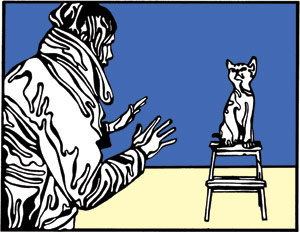I've spent the last year mapping the junker's geography – his haunts, her habits, my priorities. Over the course of the next year I'll be attempting to set down some lessons learned while traveling the junkscape. These lessons are based on my own and others' experiences in the field, usually the failures, as a) you learn more from failure than success and b) failure is funnier. Just call me Ae-shop.

The first lesson: Never leave junk on the table. You make a deal, you take the stuff with you. Do what you need to do to close the deal, and remember: the deal isn't done until the junk is in your car and your car is on the highway.
I once made a house call to look at records in a retirement community off Hendersonville Road. The collection belonged to a very nice woman, recently widowed, seeking to simplify her life. Her husband had been the collection's primary curator. He'd been a member of the New York intelligentsia in the '50s and '60s, and had acquired a number of amazing things – books, art, music, curios. I was put on the case by another junker, a bona fide antiquer, who thought I'd handle the records respectfully.
I arrived at the condo mid-afternoon and met my client, who was understandably reluctant to part with her memories, but determined to move forward. Over the course the afternoon I heard great stories about going to nightclubs and shows in New York, seeing everything from jazz to vintage Broadway debuts. Her husband had whisked her away from a small town and dazzled her with the nightlife – her tales of coming of age in one of New York's golden eras, not quite bohemians but certainly not bourgeoisie, were vivid and charming.
I'd been told the collection was about 500 pieces strong, but when we went down into the basement, I saw it was more along the lines of 3,000! I get this a lot – owners rarely accurately estimate the number of records they have – I've also been told a stack of 20 is "hundreds of 'em." For future reference, one foot of records equals about fifty LPs.
This presented a problem. I'd come in my Nissan Sentra. All those records were not going to fit in it – a Nissan maxes out at around a K's worth of LPs. And his was a no record left behind situation. This is a common part of the junk job: taking the bad – or more accurately no longer marketable — with the good. Unfortunately, the ratio of usable to unusable in this collection was slight. Few hipsters desire to get down with the original cast recording of The Man from La Mancha or the complete works of Teresa Brewer, for better or worse.
After explaining this to my client, I started to dig through the collection. I found some very interesting jazz and folk records, and a respectable pile of winners started to emerge. I set these aside to determine my base price, and after spending a few pleasant hours chatting and sifting, I separated the wheat from the chaff.
Once I had my stack of good ones, probably about 10 percent of the collection, my price came clear, and I made my offer. A final value was agreed upon. The deal was struck. Unfortunately, it was getting late, I hadn't brought enough cash, and had nowhere near the car space to haul all of the records off. I was also late to Rebelles practice, but that's another tale entirely.
But my client and I had rapport, so we agreed to finish the deal the next afternoon.
As I walked up the basement stairs I looked back to the shelves and shelves of "not so goods" that lined the wall and sighed. That stuff was going to be hard on my back, but it was part of the job.
Then I looked over at my stack of good records. It was an interesting pile – full of lots of stuff I'd never had before. It was going to be fun to learn about the records, hear what was on them, and to figure out what they were worth. For the junker selling has rewards beyond monetary compensation.
I left the house sure I'd done right by my client and myself. The buzz of the score and the dig was ringing nicely in my head. I was ready to get back to work on the collection the next day.
Tune in next week for Part Two of The Bohemians and the Fop: The Anonymous Phone Call.


Before you comment
The comments section is here to provide a platform for civil dialogue on the issues we face together as a local community. Xpress is committed to offering this platform for all voices, but when the tone of the discussion gets nasty or strays off topic, we believe many people choose not to participate. Xpress editors are determined to moderate comments to ensure a constructive interchange is maintained. All comments judged not to be in keeping with the spirit of civil discourse will be removed and repeat violators will be banned. See here for our terms of service. Thank you for being part of this effort to promote respectful discussion.